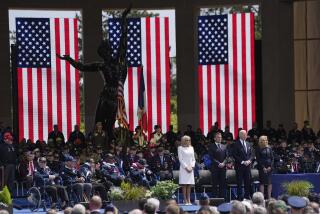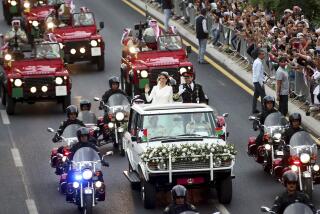Freely or Not, Iraq Supports Saddam’s Day
BAGHDAD — His excellency, great uncle to all, Iraqi President Saddam Hussein celebrated turning 65 on Sunday, and his wish seemed to be for the U.S. to hear loud and clear that his people love him dearly.
Iraqis are edgy, especially since President Bush called their country part of an “axis of evil.” They don’t want any more bombing. And they chose their leader’s birthday to pour into the streets--maybe not exactly spontaneously, but in any case in great volume--to say, in effect, “Back off.”
Of course, it is hard to know in a land like Iraq what is really in people’s hearts. Self-expression is not generally part of the landscape. But there was 11-year-old Lukman Abid pumping his fist in the air, marching in a crowd tens of thousands strong while chanting, “With our soul, with our blood, we sacrifice ourselves for Saddam Hussein.”
There was also an entire boys elementary school, the students in neat red vests and crisp white shirts, marching and shouting: “Bush, Bush, hear very well! We love our Saddam Hussein!”
True, men in dark green military uniforms--members of Hussein’s ruling Arab Baath Socialist Party, each armed with a Kalashnikov rifle--lined the parade route, and snipers stared down from rooftops.
But whether the participants marched out of love or devotion, obligation or fear, the birthday bash Iraq threw for its president--or its president threw for Iraq--made at least one point very clear: After launching two disastrous wars, enduring the antipathy of the world and suffering through 12 years of crushing economic sanctions, Saddam Hussein still has a firm grip on his people and his country. He may not be stronger than ever, but he is strong enough.
There was another point being made as well: Iraqis feel that, perhaps for the first time in years, they have the upper hand in their diplomatic arm-wrestle with America. They believe that a combination of clever diplomacy and good luck has made it nearly impossible for the U.S. to strike them right now, and they plan to keep the pressure on. There is a sense here that Iraq will very soon move to allow U.N. weapons inspectors to return, a key demand of the international community and one that would further undermine any American attack plans, they say.
“The regime is doing all it can to exploit the Palestinian crisis,” said Saad Jawad, a political scientist and author. “They are trying to make it harder for America to attack. . . . They are trying to be diplomatic.”
Hussein has not only held on to power since his military was driven from Kuwait in 1991--he has grown stronger. Analysts, diplomats and ordinary citizens here all say the West has helped him hold on, largely by keeping in place economic sanctions imposed after the invasion of Kuwait in 1990.
The idea behind the sanctions was to weaken the regime, and for a time, they did. But these days, when Iraqis can’t get medicine, they don’t blame their president. When they have to carry bagfuls of their devalued currency to pay for a small meal, they don’t blame their president. When their electricity shuts off or sewage runs into their streets, they don’t blame their president.
They blame America.
“I think they forgot who is responsible for all this,” said one European diplomat here, who said the best way to oust Hussein might be to lift the sanctions. That, he said, would focus the spotlight back on the leadership and its decisions.
“Even me, I started to forget what is the cause, what is the real problem,” said the diplomat, who has been based in Baghdad for several years. “I had to reorient myself.”
Baghdad is a sprawling capital, very flat, very rundown. Sidewalks are crumbled. In some spots, goats pick through heaps of trash.
But this is not a city in decline. In fact, it feels like one on its way back up. New luxury cars cruise the streets. Stores are filled with everything from Gillette razors to Pentium-processor computers. Not everyone has the money to buy these goods. Most don’t. But they take comfort in the merchandise being there, as another sign that their country has prevailed.
“We know very well it is the American evil which has been working against our country,” said Whalid Sabir, 29, who runs a small nut shop in the capital. “The celebration of the birthday of the president is happiness for everyone. He is a symbol, a brave man who stood up against the evil will of America and Israel.”
That’s how most people here talk, as if they were quoting a poster--which they often are. “We are renewing our absolute loyalty for President Saddam Hussein,” read one hand-lettered sign held high over the crowd at the birthday parade.
The national celebration, though an annual event, was designed this year to be one more element in a carefully crafted strategy aimed at insulating Iraq from the possibility of an American attack--and at preserving Hussein’s hold on power. That is why Iraqi authorities invited Western journalists to cover the event.
For a long time after the 1991 Persian Gulf War, Hussein in effect used a rope-a-dope strategy against the U.S. policy of containment, much as Muhammad Ali let opponents flail away at him. And it was working. Sanctions started to crumble as countries from Russia to Egypt began flights into Baghdad and others turned a blind eye and allowed all kinds of goods to be smuggled from their ports.
Then came the election of Bush and then the Sept. 11 attacks. Suddenly, there were people in Washington gunning for the Iraqi leader, along with an American appetite for revenge. As the U.S. fired rhetorical shots at Iraq, Hussein was determined not to wait for bombs to fall. Not again.
He went on the diplomatic offensive--an offensive that went into overdrive after Bush made his “axis of evil” remark this year in his State of the Union address. Bush was referring to North Korea, Iran and Iraq. But the way the Iraqis see it, only Baghdad was in imminent danger. Washington at least had some dialogue with the other two.
So Hussein sent his emissaries around the Arab world. When Vice President Dick Cheney visited the Middle East to drum up support for action against Iraq, Hussein’s men were not far behind. The culmination of the Iraqi strongman’s diplomatic efforts came at the Arab League summit in Beirut last month, when Iraq and its Gulf neighbors, Kuwait and Saudi Arabia, agreed publicly to begin to reconcile.
Then, as people here see it, the country got really lucky. The Israeli-Palestinian conflict flared with a string of Palestinian suicide bombings, followed by Israel’s military invasion of the West Bank. Hussein looked to rally the Arab street behind him, and he did it well, halting oil exports and promising $25,000 to every family that lost a house in the Palestinian refugee camp of Jenin.
Those tactics did little to help Palestinians, but they elevated Hussein in the eyes of angry and dispirited Arabs, frustrated by their own leaders’ reluctance to do anything.
“Anybody who stands up to America and the West will be championed in the Arab world,” said Saadalla Fathi, a recently retired advisor to the Oil Ministry. “Whatever is achieved does not matter. Iraq is standing on principle. Iraq has support in the Arab countries and among a large majority of the Arabs.”
Hussein has also managed to retain control of the true levers of power in Iraq.
“Such a regime, its main power. its strength, springs not from what you see,” said Jawad, the political scientist. “The real power comes from the military, security and the [Baath] party.”
In Baghdad on Sunday, 18-wheel trucks loaded with people ferried their cargoes around the city for the two main marches. On 14th of Ramadan Street, huge crowds walked past the reviewing stand, most seemingly unaware that they were stepping on two flags painted on the ground. One was Israel’s, the other the United States’. The marchers were too busy shouting and waving at the president’s proxy on the stage, a member of the Revolutionary Command Council. Hussein’s only appearance of the day was on television.
“We are here in order to show loyalty to President Saddam Hussein,” said Nagham Shaker, 24, repeating the same line spoken by others along the parade route. “No one forced us. We came by our own will.”
When they had passed the reviewing stand and were out of sight of the rifle-wielding party members, many of the marchers drifted off. For them, the celebrating was over.
More to Read
Sign up for Essential California
The most important California stories and recommendations in your inbox every morning.
You may occasionally receive promotional content from the Los Angeles Times.










